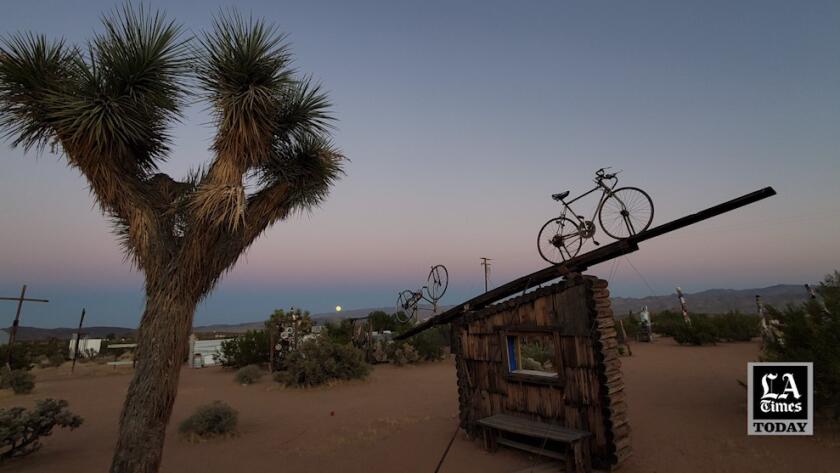LA Times Today: My Country: Despite isolation and racism, Black Americans feel at home in California’s desert
Watch L.A. Times Today at 7 p.m. on Spectrum News 1 on Channel 1 or live stream on the Spectrum News App. Palos Verdes Peninsula and Orange County viewers can watch on Cox Systems on channel 99.
- Share via
Tourists flock to California’s deserts to lose themselves in its otherworldly landscapes, enjoy its dazzling sunsets, and forget about their troubles in getaways like Palm Springs.
But for Black Americans who call the desert home, it presents a more complicated escape. Segregation, generational poverty, displacement, casual slights that sting like a thousand cuts. Even in idyllic playgrounds like Palm Springs and in the communities that border Joshua Tree National Park not far away, there’s no refuge from America’s history of racism.
I traveled two and a half hours east of L.A. to listen to the stories the Black Californians who’ve built lives in the desert, and whose families in some cases go back multiple generations. I also paid a visit to an outdoor museum that’s become a place of reflection for me. It’s the creation of Noah Purifoy, the late L.A. artist who gained fame in the aftermath of the 1965 Watts Uprising by turning the charred remains of buildings in the Black community into artwork.
Purifoy’s 10-acre museum is filled with found objects that have been assembled in ways that reference Black Americans’ struggle for acceptance. There’s a simulation of a white’s only water fountain, voting booths that appear to commemorate the fight for voting rights, crosses that bring to mind lynchings and Klan rallies. It’s a sobering place.
Purifoy once said that “Being African American, we have a lot more to be angry about than other people.”
This trip reminded me of how much truth there is in that sentiment.
I can’t count all the times I’ve listened as Black people across this country have relayed instances in which they’d been treated as if they didn’t belong, as if their lives didn’t matter.
It was disheartening to hear similar stories as I moved from Palm Springs to the military town of Twentynine Palms.
But my visit also reminded me of our resilience, and our capacity for grace and good humor.
New York natives Carrie Williams and her sister Karen Harper told me how they cope with the social isolation and racial hostility they’ve faced in the 30 years they’ve lived the high desert. Harper’s taken groups of friends to a local observatory to gaze at the stars and she loves driving into Joshua Tree to just let her mind wander.
Meanwhile, her sister has recently taken up rock climbing.
The sisters were so full of laughter when met. It was only after we’d parted ways that I realized that their smiles were a form of defiance.
We as Black Americans may never be able to completely let down our guard and free ourselves from the pain of our past or the injustices that happen in our own time. But our knack for reassembling the heartaches that bind us into moments of beauty and lightness - that travels with us wherever we go.
I’m Tyrone Beason for the Los Angeles Times.
But for Black Americans who call the desert home, it presents a more complicated escape. Segregation, generational poverty, displacement, casual slights that sting like a thousand cuts. Even in idyllic playgrounds like Palm Springs and in the communities that border Joshua Tree National Park not far away, there’s no refuge from America’s history of racism.
I traveled two and a half hours east of L.A. to listen to the stories the Black Californians who’ve built lives in the desert, and whose families in some cases go back multiple generations. I also paid a visit to an outdoor museum that’s become a place of reflection for me. It’s the creation of Noah Purifoy, the late L.A. artist who gained fame in the aftermath of the 1965 Watts Uprising by turning the charred remains of buildings in the Black community into artwork.
Purifoy’s 10-acre museum is filled with found objects that have been assembled in ways that reference Black Americans’ struggle for acceptance. There’s a simulation of a white’s only water fountain, voting booths that appear to commemorate the fight for voting rights, crosses that bring to mind lynchings and Klan rallies. It’s a sobering place.
Purifoy once said that “Being African American, we have a lot more to be angry about than other people.”
This trip reminded me of how much truth there is in that sentiment.
I can’t count all the times I’ve listened as Black people across this country have relayed instances in which they’d been treated as if they didn’t belong, as if their lives didn’t matter.
It was disheartening to hear similar stories as I moved from Palm Springs to the military town of Twentynine Palms.
But my visit also reminded me of our resilience, and our capacity for grace and good humor.
New York natives Carrie Williams and her sister Karen Harper told me how they cope with the social isolation and racial hostility they’ve faced in the 30 years they’ve lived the high desert. Harper’s taken groups of friends to a local observatory to gaze at the stars and she loves driving into Joshua Tree to just let her mind wander.
Meanwhile, her sister has recently taken up rock climbing.
The sisters were so full of laughter when met. It was only after we’d parted ways that I realized that their smiles were a form of defiance.
We as Black Americans may never be able to completely let down our guard and free ourselves from the pain of our past or the injustices that happen in our own time. But our knack for reassembling the heartaches that bind us into moments of beauty and lightness - that travels with us wherever we go.
I’m Tyrone Beason for the Los Angeles Times.

